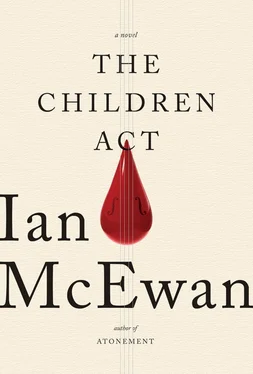He must have packed his bag earlier in the evening, well before the start of their conversation. Or conceivably, halfway, when he had retreated to the bedroom. Instead of turmoil or anger or sorrow she felt only weariness. She thought she would be practical. If she could get to bed now she could avoid taking a sleeping pill. She went back into the kitchen, telling herself that she was not looking for a note on the pine table, where they always left each other notes. There was nothing. She locked the front door and switched off the hallway lights. The bedroom looked undisturbed. She slid open his wardrobe and with a wifely eye calculated that he had taken three jackets, the newest of which was off-white linen from Gieves & Hawkes. In the bathroom she resisted opening his cabinet to estimate the contents of his washbag. She knew enough. In bed her only sensible thought was that he must have taken great care going along the hall without her hearing, and closed the front door inch by deceitful inch.
Even that was not enough to stop her descent into sleep. But sleep was no deliverance, for within the hour she was ringed by accusers. Or they were asking for help. The faces merged and separated. The baby twin, Matthew, with the earless bloated head and heart that wouldn’t squeeze, simply stared, as he had on other nights. The sisters, Rachel and Nora, were calling to her in regretful tones, listing faults that may have been hers or their own. Jack was coming closer, pushing his newly creased forehead into her shoulder, explaining in a whining voice that her duty was to expand his choices into the future.
When her alarm rang at six thirty she sat up suddenly and for a moment stared without comprehension at the empty side of the bed. Then she went into the bathroom and began to prepare herself for a day in court.
Two

SHE SET OFF on her usual route from Gray’s Inn Square to the Royal Courts of Justice and did her best not to think. In one hand she carried her briefcase, in the other an umbrella aloft. The light was gloomy green and the city air was cool against her cheeks. She went out by the main entrance, avoiding small talk by nodding briskly at John, the friendly porter. Her hope was that she didn’t look too much like a woman in crisis. She kept her mind off her situation by playing to her inner ear a piece she had learned by heart. Above the rush-hour din it was her ideal self she heard, the pianist she could never become, performing faultlessly Bach’s second partita.
Rain had fallen most days of the summer, the city trees appeared swollen, their crests enlarged, the pavements were cleansed and smooth, the cars on High Holborn showroom clean. Last time she had looked, the Thames at high tide was also swollen and a darker brown, sullen and rebellious as it rose against the piers of the bridges, ready to take to the streets. But everyone pushed on, complaining, resolute, drenched. The jet stream was broken, bent southward by factors beyond control, blocking the summer balm from the Azores, sucking in freezing air from the north. The consequence of man-made climate change, of melting sea ice disturbing the upper air, or irregular sunspot activity that was no one’s fault, or natural variability, ancient rhythms, the planet’s lot. Or all three, or any two. But what good were explanations and theories so early in the day? Fiona and the rest of London had work to get to.
By the time she was crossing the street to go down Chancery Lane, the rain was coming down harder, at a fair slant, driven by a sudden cold wind. Now it was darker, droplets bounced icily against her legs; crowds hurried by, silent, self-absorbed. Traffic along High Holborn poured past her, loud and vigorously undeterred, headlights gleaming on the asphalt while she listened again to the grand opening, the adagio in the Italian style, a distant promise of jazz in the slow dense chords. But there was no escape, the piece led her straight to Jack, for she had learned it as a birthday present to him last April. Dusk in the square, both just back from work, table lamps lit, a glass of champagne in his hand, her glass on the piano as she performed what she had patiently committed to memory in the previous weeks. Then his exclamations of recognition and delight and kindly overdone amazement at such a feat of recall, their long kiss at the end, her murmur of happy birthday, his moist eyes, the clink of their cut-glass flutes.
Thus the engine of self-pity began to turn and she helplessly summoned various treats she’d arranged for him. The list was unhealthily long—surprise operas, trips to Paris and Dubrovnik, Vienna, Trieste, Keith Jarrett in Rome (Jack, knowing nothing, instructed to pack a small case and passport and meet her at the airport straight from work), tooled cowboy boots, engraved hip flask and, in recognition of his new passion for geology, a nineteenth-century explorer’s specimen hammer in a leather case. To bless his second adolescence on turning fifty, a trumpet that had once belonged to Guy Barker. These offerings represented only a fraction of the happiness she urged on him, and sex was only one part of that fraction, and only latterly a failure, elevated by him into a mighty injustice.
Sorrow and the mounting details of grievances, while her true anger lay ahead. An abandoned fifty-nine-year-old woman, in the infancy of old age, just learning to crawl. She forced herself back to her partita as she turned off Chancery Lane down the narrow passage that led her into Lincoln’s Inn and its tangle of architectural splendor. Over the drumming of raindrops on her umbrella, she heard the lilting andante, walking pace, a rare marking in Bach, a beautiful carefree air over a strolling bass, her own steps falling in with the unearthly lighthearted melody as she went by Great Hall. The notes strained at some clear human meaning, but they meant nothing at all. Just loveliness, purified. Or love in its vaguest, largest form, for all people, indiscriminately. For children perhaps. Johann Sebastian had twenty by two marriages. He didn’t let his work prevent him loving and teaching, caring and composing for those who survived. Children. The inevitable thought recurred as she moved on to the demanding fugue she had mastered, for love of her husband, and played at full tilt without fumbling, without failing to separate the voices.
Yes, her childlessness was a fugue in itself, a flight—this was the habitual theme she was trying now to resist—a flight from her proper destiny. Her failure to become a woman, as her mother understood the term. How she arrived at her state was a slow-patterned counterpoint played out with Jack over two decades, dissonances appearing, then retreating, always reintroduced by her in moments of alarm, even horror, as the fertile years slipped by until they were gone, and she was almost too busy to notice.
A story best told at speed. After finals, more exams, then the call to the bar, pupillage, a lucky invitation to prestigious chambers, some early success defending hopeless cases—how sensible it had seemed, to delay a child until her early thirties. And when those years came, they brought complex worthwhile cases, more success. Jack was also hesitant, arguing for holding back another year or two. Mid-thirties then, when he was teaching in Pittsburgh and she worked a fourteen-hour day, drifting deeper into family law as the idea of her own family receded, despite the visits of nephews and nieces. In the following years, the first rumors that she might be elected precociously to the bench and required to be on circuit. But the call didn’t come, not yet. And in her forties, there sprang up anxieties about elderly gravids and autism. Soon after, more young visitors to Gray’s Inn Square, noisy demanding great-nephews, great-nieces, reminded her how hard it would be to squeeze an infant into her kind of life. Then rueful thoughts of adoption, some tentative inquiries—and throughout the accelerating years that followed, occasional agonies of doubt, firm late-night decisions concerning surrogate mothers undone in the early-morning rush to work. And when at last, at nine thirty one morning at the Royal Courts of Justice, she was sworn in by the Lord Chief Justice and took her oath of allegiance and her Judicial Oath before two hundred of her bewigged colleagues, and she stood proudly before them in her robes, the subject of a witty speech, she knew the game was up; she belonged to the law as some women had once been brides of Christ.
Читать дальше













